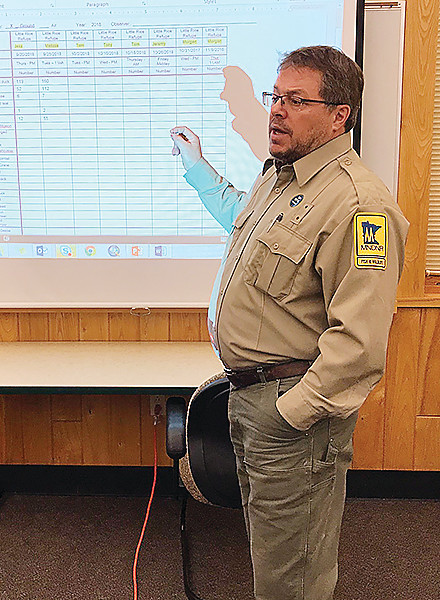Support the Timberjay by making a donation.
Local hunters blast Little Rice refuge status
But written comments reflect broader support for continued designation
TOWER— Turnout was light, but those who did show up for a public input session on the future of the Little Rice Lake wildlife refuge, had plenty to say— most of it strongly opposed to a …
This item is available in full to subscribers.
Attention subscribers
To continue reading, you will need to either log in to your subscriber account, or purchase a new subscription.
If you are a current print subscriber, you can set up a free website account and connect your subscription to it by clicking here.
If you are a digital subscriber with an active, online-only subscription then you already have an account here. Just reset your password if you've not yet logged in to your account on this new site.
Otherwise, click here to view your options for subscribing.
Please log in to continue |
Local hunters blast Little Rice refuge status
But written comments reflect broader support for continued designation
TOWER— Turnout was light, but those who did show up for a public input session on the future of the Little Rice Lake wildlife refuge, had plenty to say— most of it strongly opposed to a continuation of the refuge.
The input, at an Oct. 16 meeting at the DNR area office here, comes as the Department of Natural Resources is set to decide whether to continue the refuge status, which took effect for five years, beginning in 2012. The 288-acre lake was actually open to hunting this year, although few hunters were aware of the change in status.
Tom Rusch, DNR wildlife manager for the Tower work area, said duck surveys at Little Rice have shown that ducks, mostly ringnecks, are using the lake in significant numbers. That’s the goal, according to Rusch, since it allows ducks to remain in the area longer, providing better opportunity for duck hunters on neighboring lakes. The lake’s refuge status had run from Sept. 1- Nov. 25.
Nearby Big Rice Lake has been heavily hunted for years, but Rusch said when ducks face hunting pressure on both lakes, they tend to move on quickly. By providing a safe zone, he said, ducks will remain in the area longer, and tend to move back and forth between the two rice lakes.
That might be good news for hunters on Big Rice, but it hasn’t sat well with some of the hunters who traditionally spread their decoys on Little Rice. Robert Croteau, of Biwabik, said he built a hunting shack a quarter mile from Little Rice for the express purpose of hunting the lake, and now he’s been shut out. He said he doesn’t think the refuge has attracted any more ducks to the lake. “I was there on Friday, and there was not a damn duck on the lake, just three swans. Is that what we are protecting? They aren’t protecting ducks anywhere in the country except these few little lakes.”
Steve Vukelich also voiced his opposition. “In theory the refuges do work, but in practice it’s a whole different game,” he said. “The few times I was out on Little Rice this fall, maybe my timing is off, but I was not seeing birds…there is nothing. I am not hearing shooting from Big Rice either.”
Jeff Borges, who also owns a hunting shack near Little Rice, questioned whether DNR surveys are accurately recording the number of ducks that use the lake. “I haven’t seen near those numbers,” he said. “To me it is not doing what is meant to do.”
All involved seemed to agree that the deterioration in the rice crop on Big Rice Lake likely has more to do with the disappointing duck hunting on the lake than anything else, which is a separate issue that the DNR is hoping to address through improved rice management efforts on Big Rice.
Rusch noted that state policy encourages the use of wildlife refuges as a means of holding ducks during the hunting season, adding that northern St. Louis County only has four small wildlife refuges, including Little Rice. “They provide secure feeding and resting habitat for migratory waterfowl,” said Rusch. “That prevents hunters from pushing ducks south, and prolongs hunting opportunities.”
After five years, Rusch said the DNR’s own duck surveys show the refuge is attracting ducks along with the brickbats of former hunters on the lake.
So far, said Rusch, written comments have been largely supportive of the refuge. The comment period on the issue ended Tuesday, Oct. 23. According to Rusch, the comments go first to a DNR hearing officer, who forwards them to the regional wildlife manager for a decision. “You’ll read about it when it comes out in the papers,” said Rusch.






